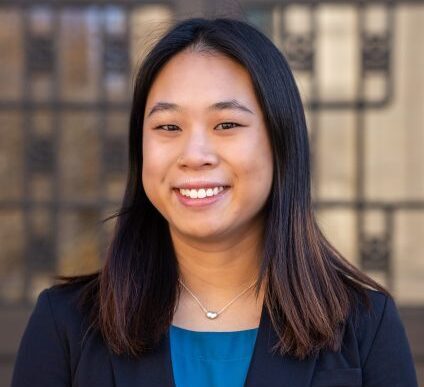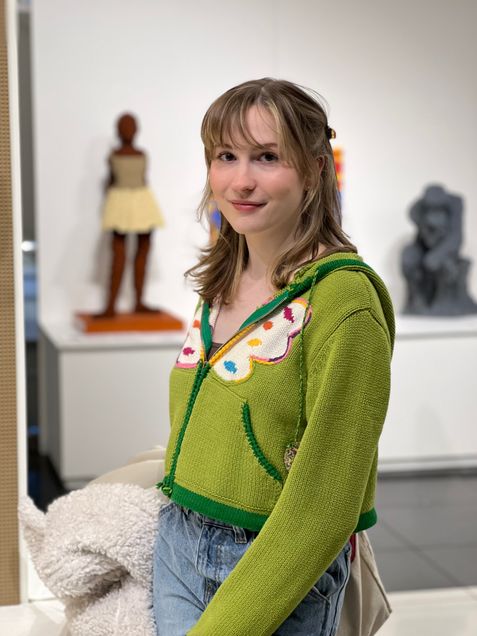Connecting students with chances to learn outside the classroom
New mentorship program from the Experiential Learning Connector helps first-year students find the perfect learning opportunities for their interests
New mentorship program from the Experiential Learning Connector helps first-year students find the perfect learning opportunities for their interests
Audrey Johnson realized she wanted to change majors and needed help finding the right path. Rena Nurhussien, a first generation college student, sought advice about and insight into the science classes she would be taking. Both turned to the CAS Experiential Learning Connector, a new resource devoted to helping CAS students find experiential learning opportunities, for help.
Experiential learning (EL)—such as on-campus jobs, internships, study abroad programs, and research projects—teaches students essential skills that classroom instruction alone can’t. EL opportunities abound at BU, but identifying the right opportunity—especially as a first-year—is often a roadblock to students’ participation.
 Erin Salius, director of the Experiential Learning Connector, says feedback from undergraduate focus groups helped her realize that a key priority for this past academic year was to make sure students are aware of all the EL opportunities available to them.
Erin Salius, director of the Experiential Learning Connector, says feedback from undergraduate focus groups helped her realize that a key priority for this past academic year was to make sure students are aware of all the EL opportunities available to them.
As part of this effort, the Experiential Learning Connector launched the Experiential Learning Mentorship Program in the spring 2023 semester. By pairing sophomore, junior, and senior mentors with first-year mentees, Salius hopes the program can help them identify relevant EL opportunities and find answers to questions they may have about their areas of study.
Salius says that, whenever possible, the program tries to pair students who have similar majors and professional goals. “But we also emphasize that first-year students do not need to know what they want to major in before joining the program. The whole point is that exploration—of all kinds—is encouraged, and we want first-year students to feel supported as they try new things and follow their passions.” The pilot semester had 32 students participate as mentors and mentees.
Aly Lam and Libby McClelland were among 14 students to join as mentors. Lam (CAS’25), a political science major and business minor, mentored Johnson (CAS’26), who hasn’t declared a major but is interested in political science and business. McClelland (CAS’23, GRS’23) mentored Nurhussien (CAS’26, Sargent’26), who is studying biochemistry, molecular biology, and Arabic, and plans to switch to Sargent College’s BS in Human Physiology program in fall 2023 to work toward her goal of becoming a physician’s assistant.
Lam knew her experiences would be particularly helpful for Johnson. “I could tell her what I like about the poli sci department, what I like about Questrom, and the difference in what classes you’re going to get, what kind of professors you’re going to get, and the kind of schedule you’re going to have for the rest of your years here,” Lam says.
As part of the program, mentors and mentees attend four workshops, which discuss the benefits of EL and give the first-year students self-assessment and reflection exercises meant to help them find experiences that match their needs and interests. Then, they meet with each other at least six times throughout the semester.

Lam was eager to be a mentor because of her own EL experiences, which include interning in the Graduate Program in Urban Biogeoscience and Environmental Health (BU URBAN) office. “My supervisor really wanted us to use our experiences and interests to kind of build our own program, work on the projects we wanted to work on, and figure it out as we went, which I think is the best way to learn,” she says. As BU URBAN’s communications and impact intern, Lam worked on diversity, equity, and inclusion initiatives, designed communications materials, and created social media posts.
Lam also interned for a California State Assembly candidate’s campaign near Santa Cruz, Calif., in the summer of 2022. “It was on-the-ground work and, though it was frustrating at times—I was cold calling voters and getting a lot of voicemails, a lot of people who didn’t want to talk or just hung up on me—I knew that was part of campaigning or canvassing,” she says. “It was a good way for me to dip my toe into what it would be like to work in politics at a local level.”

McClelland, who recently graduated with her BS in cell and molecular biology and MS in biology, gave Nurhussien advice about classes and where to seek out EL opportunities. “We talked about classes that had experiential learning components. There is a genetics class that I loved where it simulates working on a research project, going through the process of designing an experiment, which I think is a valuable experience.”
After interning at the biotech company Resilience, McClelland joined the staff as a research associate in its Waltham, Mass., office in August 2023. She found out about the internship through Handshake, BU’s career resource platform. “When I was a freshman, I thought Handshake was daunting,” she says. So, she thought it would be helpful to walk Nurhussien through the job and internship resources available to students. “We talked about the different search parameters and ways to apply to positions through Handshake. It’s an underutilized resource.” They also discussed how to use LinkedIn to find opportunities, how to make the most of BU’s Career Center, and how résumé workshops offered through the Biology department could be helpful. “It was sitting down and saying, ‘OK, there’s a lot out there, but it’s not as scary as it first seems.’”
McClelland says the EL opportunities she pursued while at BU also helped her land her job. Those opportunities include being part of Innovate@BU’s First-Year Innovation fellowship, in which she and a few peers created a zero-waste company. “We got funding, but COVID unfortunately shut us down right before we were about to incorporate.”
The following summer, in the wake of the pandemic, she helped establish the Innovate@BU New Normal Challenge, which called on students to come up with ideas for the transition back to campus in the fall. “I talked about having that opportunity to work on that initiative from start to finish in my interview, and what a valuable experience it was,” McClelland says. She stresses that even pursuing opportunities seemingly outside the scope of your major can help you exercise transferable skills. “I ended up talking to my boss later and he said that while I didn’t have all of the research experience—because COVID knocked out a lot of that time that I was planning to do that—I had the mentality he was looking for. I was able to show how I can adapt and innovate.”
Finding the opportunities

“I’m a hands-on learner,” says Nurhussien of her motivation to join the Experiential Learning Connector. She joined a community service fraternity and participated in service projects around the Boston area. She hopes to seek out more EL opportunities in the next academic year. She says she most appreciates the guidance and support McClelland provided. “As a first year, first-generation student, having someone who’s been in college, who can give tips and advice, and who you can look up to and ask questions to help you navigate your path—that has been really great.”
When Johnson received an email about the Experiential Learning Connector, “I applied on a whim,” she says. She had entered BU as a biochemistry major, but within a few months she knew she wanted to pursue something different. “I figured I could use some guidance,” she says. While she expected to get helpful advice from the program, she hadn’t expected to form such a bond with Lam. “I love my mentor. We were paired perfectly, and we’re friends now.”
The mentorship program helped Johnson find a summer opportunity participating in a campaign in Washington, D.C., focused on Chesapeake Bay conservation efforts and reducing plastic use, which provided her a chance to use her combined interests.

For Johnson, one of the most impactful moments of the program came during a panel discussion where graduating students spoke about their post-graduation plans. “That was a very nice way to close the program,” she says. “It gave the mentees more insight on what people’s plans are, whether it’s to continue their education or go straight into the workforce.” The key advice that struck Johnson: “Failure is okay. Everyone on the panel was very accomplished, and their plans for the next year sounded very ambitious. But they also kept repeating that throughout college, they failed at a lot of things. Many changed their majors last-minute. Still, I saw that it all works out.”